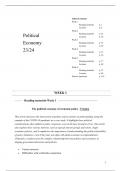Samenvatting
Complete Summary Political Economy - 2023/2024
- Instelling
- Universiteit Van Amsterdam (UvA)
This is a very comprehensive and structured summary of the course Political Economy (2023/2024). It includes all readings and all lectures notes. At the end I've also added for each lecture some essay questions with answers to practice (AI generated, but all based on the notes of the lectures). I ...
[Meer zien]




